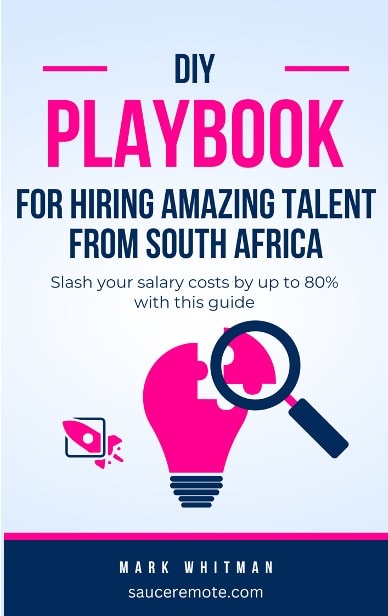If you’re reading this, you're probably toying with the idea of starting your own recruitment agency in South Africa.
Maybe you've worked in the industry for a while and think it's time to branch out on your own, or maybe you're simply passionate about connecting people with jobs they love.
Either way, I've been down that road myself, and I’m here to share what I’ve learned—the pitfalls, the wins, and the steps that will get you started.
Buckle up; this is going to be your ultimate "how to start a recruitment agency in South Africa" guide.
Ready? Let's roll.

Discover how to slash your salary costs by 80%
Get our exact process for hiring amazing overseas talent from South Africa. Includes copy-and-paste templates and a detailed salary guide.
Why Start a Recruitment Agency in South Africa?
South Africa’s recruitment landscape is dynamic and, to be honest, pretty exciting right now.
The demand for talent is high, particularly with the rise of remote work trends. This means local talent has more global opportunities than ever.
South African and international companies are just as keen to secure the best individuals—whether they’re in Cape Town, Joburg, or halfway across the world.
There's a lot of opportunity if you know where to look.
The recruitment market in South Africa was recently valued at around $1642.72 million, and projections suggest further growth.
That’s good news if you’re considering diving into this sector, but—here’s the thing—you’ve got to do it right.
The competition is stiff, with both local and international recruitment agencies in South Africa vying for the top talent.
So, how do you stand out and actually make this work?
Easy: you follow my 7 steps.
Hire remote talent from South Africa & slash salary costs by 80%
Salaries start from £8,000 per year!
7 Steps to Start Your First Recruitment Agency in South Africa
Here's how I started Sauce, a top recruitment agency in South Africa.
Step 1: Understand Your Niche
The first thing I tell anyone wanting to start a recruitment agency is: find your niche.
The recruitment industry is broad—from engineering to finance to healthcare—and you can’t be everything to everyone.
Pick one sector that you understand well or that you're passionate about.
Maybe you’ve worked in IT recruitment before, or you’ve got a background in hospitality. Use that insider knowledge to your advantage.
If you can, zero in even further—for instance, instead of just focusing on IT, think about specialising in cybersecurity roles.
Or, instead of healthcare, maybe focus on remote health tech positions.
But wait, why do this?
Specialising gives you credibility, which is exactly what you need to build relationships with clients and candidates.
For instance, at Sauce, we specialise in digital marketing and sales roles. It's our focus that wins specific clients and makes it easy for us to find suitable candidates.
Got that? Let's talk legalities next.
Hire remote talent from South Africa & slash salary costs by 80%
Salaries start from £8,000 per year!
Step 2: Learn the Legal Stuff
Okay, I know—paperwork isn’t the fun part. However, understanding the legal requirements is critical to starting your recruitment agency on solid footing.
In South Africa, you’ll need to register your business with the Companies and Intellectual Property Commission (CIPC), get a Tax Clearance Certificate from SARS, and comply with B-BBEE regulations.
Another thing to consider is labour laws—the Basic Conditions of Employment Act (BCEA) and the Labour Relations Act (LRA) are essential reading.
You’ll need to understand these to navigate things like employment contracts, minimum wage, and fair labour practices.
The last thing you want is to end up on the wrong side of a labour dispute because you didn’t understand the regulations.
My pro tip: Check out my guide on an employer of record in South Africa to learn what laws you'll have to deal with.
Great. Let's move on to step 3.
Hire remote talent from South Africa & slash salary costs by 80%
Salaries start from £8,000 per year!
Step 3: Get Your Tech in Place
Here’s where it starts to get exciting.
Modern recruitment is all about tech—you’ll need an Applicant Tracking System (ATS) to manage your candidates efficiently.
There are plenty of options out there, from basic software for small teams to more advanced platforms for those planning to scale up.
If you’re thinking about focusing on remote opportunities, ensure your tech stack is friendly to those needs—for example, tools that make video interviewing seamless.
At Sauce, we use Loom. It’s excellent.
Here’s some other recruitment software I recommend:
- Applicant Tracking Systems (ATS): Consider using platforms like Workable, Breezy HR, or Bullhorn to manage candidates efficiently.
- Video Interviewing Tools: Tools like Loom, Zoom, or HireVue make remote interviewing seamless.
- CRM for Recruitment: Use HubSpot or Zoho Recruit for client relationship management.
- Automation Tools: Calendly for scheduling, Zapier for workflow automation, and Mailchimp for email campaigns can significantly streamline your processes.
- Job Board Integrations: Tools like LinkedIn Recruiter or Indeed help you expand your reach and attract the right candidates.
Automation is also your friend.
From scheduling interviews to sending candidate emails, the right tech can save you loads of time and allow you to focus on what really matters—building relationships.
Hire remote talent from South Africa & slash salary costs by 80%
Salaries start from £8,000 per year!
Step 4: Build a Network That Works for You
This is probably the single most important part of recruitment—relationships.
Your clients need to trust you, and your candidates need to feel like you’ve got their back.
Start by reaching out to your existing contacts. Let them know what you’re doing, and see if they have any referrals for you.
If you’re starting from scratch, LinkedIn is going to be your new best friend.
Don’t just connect with people—engage.
Share articles, comment on posts, and get involved in conversations. Attend industry events (even virtual ones) and always have your ‘elevator pitch’ ready.
People need to know who you are and what makes you different from the top recruitment agencies in South Africa.
Once you've started building your network, you must focus on a solid marketing plan.
Hire remote talent from South Africa & slash salary costs by 80%
Salaries start from £8,000 per year!
Step 5: Create a Solid Marketing Plan
No one can hire you if they don’t know you exist.
You’re going to need a website, and it’s worth investing some money here.
Make sure it looks professional, clearly explains what you do, and includes testimonials as soon as you have them.
SEO (Search Engine Optimization) is key—use keywords like ‘top recruitment agencies in South Africa’ and ‘international recruitment agencies South Africa’ to help get your site found by the right people.
Content marketing can also set you apart—think blog posts, industry news, or even case studies of successful placements you’ve made.
It shows clients that you know your stuff, and it builds trust with potential candidates, too.
Hire remote talent from South Africa & slash salary costs by 80%
Salaries start from £8,000 per year!
Step 6: Master the Art of Remote Recruitment
One of the biggest remote work trends right now is the shift towards fully remote teams, even across borders. This can be a major selling point for your agency if you do it well.
Understand the nuances of recruiting for remote positions—candidates will need different skills (think self-management and communication), and you’ll need to understand different tax laws and employment regulations if you’re placing candidates internationally.
Consider offering remote roles as part of your niche.
Thanks to a favourable exchange rate and a highly skilled workforce, South African talent is becoming increasingly attractive to international companies.
If you can position yourself as an expert in remote and international recruitment, you're already a step ahead.
My pro tip: Check out What Does EOR Stand For to learn more about international recruitment.
Let's move on to the final step.
Hire remote talent from South Africa & slash salary costs by 80%
Salaries start from £8,000 per year!
Step 7: Make Your First Placement
Finally, you’re ready to make your first placement. It’s going to be exhilarating, trust me.
The key here is to overdeliver—both for your client and your candidate.
Ensure the job spec is as clear as possible, screen candidates thoroughly, and guide them through the interview process.
Keep in constant communication, and don’t ghost anyone—the recruitment world is small, and your reputation will follow you.
Celebrate the wins, learn from the losses, and, most importantly, always keep improving.
There’s a lot of room to grow in this industry, but it requires dedication, relationship-building, and a willingness to pivot when things aren’t working.
Hire remote talent from South Africa & slash salary costs by 80%
Salaries start from £8,000 per year!
My Final Thoughts
And there you have it: Starting a recruitment agency in South Africa can be incredibly rewarding. It’s a chance to help people find opportunities that change their lives while building a business that offers you flexibility and independence.
If you're prepared to find your niche, build relationships, and stay on top of industry trends—you've got this.
So, what are you waiting for?
Start with step one and keep moving forward. And hey, I’m always here if you need a bit of advice—just shoot me a message.
